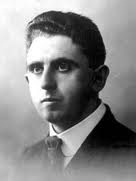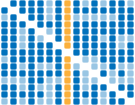The page of Ehrenstein, Albert, English biography
Biography
Ehrenstein, Albert (Vienna, 1886-1950, New York), of Jewish descent, studied in the Philosophical Faculty of Vienna University. He obtained his doctorate in 1910, the year in which Karl Kraus published his first poetry in Die Fackel. In 1911 he settled as a writer and critic in Berlin where O. Kokoschka brought him into contact with H. Walden. Much of his work first appeared in Der Sturm and F. Pfemfert's Die Aktion. After the 1914-18 War he travelled restlessly within Europe and other continents, and in 1932 emigrated to Switzerland, in 1941 to the USA where he died in poverty, having long virtually ceased to write. He is chiefly known as an Expressionist poet who, capable of lyrical ecstasy, uses his gift for irony, satire, and the grotesque to express his bitter disillusionment with ‘barbaric’ Europe (‘Barbaropa’) and contemporary civilization (Die weiße Zeit, 1914; Der Mensch schreit, 1916; Die rote Zeit, 1917; Wien, 1921; Briefe an Gott, 1922, repr. 1979; Herbst, 1923; and Mein Lied, 1932, containing his collected poetry written between 1900 and 1931).
His prose works, beginning with the Expressionist story Tubutsch (1911, with illustrations by Kokoschka) and Der Selbstmord eines Katers (1912, as Bericht aus einem Tollhaus, 1919), appeared as Ritter des Todes (1926). Other works include his translations, mainly from the Chinese, as in China klagt. Nachdichtungen revolutionärer chinesischer Lyrik aus drei Jahrtausenden (1923). Karl Kraus (1920) is a polemical essay; Menschen und Affen (1926) a collection. Werke (5 vols.), ed. H. Mittelmann, appeared 1988 ff., Briefe, 1989.
(Editor of this page: P. T.)




